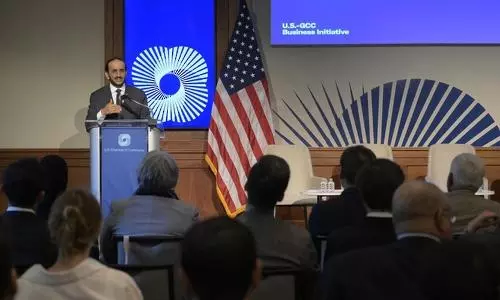
Can the stimulus package deliver the goods?
text_fieldsThe damage inflicted by COVID-19 pandemic in the lives of every individual is so severe that the country needs a social and economic rebuilding. Pressure was mounting from all corners of the country to urgently declare packages that would stimulate the industrial sector and rejuvenate civil life which was thrown out of gear.
Thus the context was already set when prime minister Narendra Modi declared the Rs 20 trillion 'AtmaNirbhar Bharat Abhiyan'. Finance minister Nirmala Sitharaman has announced its details in phases. It is too early to assess to what extent the self-reliant India package will help the country tide over the crisis. Even prior to COVID, the country had been experiencing a grave economic crisis. And that in its turn was the result of lopsided economic planning through demonetisation, the disruption caused by the implementation of GST and pro-corporate bias. COVID came on top of them. As for the question whether the Centre's new package will act as stimulant to the socio-economic spheres of the country, sociologists and economists are giving mixed responses.
The fact that the package amounts to ten per cent of GDP will give a spur to the economy. What the central government aims is to ensure funds availability through offering loans in different sectors. The core of the plan revealed so far consists in loans to sectors ranging from farmers to small and medium enterprises. Certainly, announcements related to financial institutions will in general boost the confidence of entrepreneurs and convince them of the availability of funds. And the change in the definition of small enterprises will serve to attract more invesments and to ease loans. The relaxation in the TDS of non-salary income by 25 per cent also will enhance cash availability. The reduction in share of Employee Provident Fund (EPF) to 10 per cent for three months will offer temporary relief to 6.5 lakh firms and 4.3 crore people. But how feasible the urban-centred food and housing schemes for inter-state labourers will be, can be assessed only after COVID.
Most of the loans, which are expected to be stimulants, are those without any concessions in interest. Although loans with moratorium will help entrepreeurs to overcome immediate dearth of funds, it will not result in much benefit in terms of financial liability because of the obligation to pay up the interest during the moratorium period too. It is doubtful whether banks, which face crisis owing to the swindling of big tycoons, will be ready to sponsor projects without adequate collaterals. Most of the package, in the absence of feasible methods to ensure lending, are likely to remain on paper. The right way to save rural farmers, street vendors and small entrepreneurs would be a decision to give interest concessions or interest-free loans. Only then will loans come to be of real value to entrepreneurs. This is a demand raised by many including Kerala chief minister, but what emerges from the press confereces of the finance minister on two days is that the Centre is not enthusiastic about working on such a concept.
By this time, criticisms have been raised that the packages placed before the nation by the prime minister and the finance minister, are not adequate to comprehensively address the multi-faceted crisis of the country and to build up a self-reliant India. The main plank of the criticism is that there is not much in the FM's package to make cash available in the hands of the common man, by reducing administrative expenses. The minister does not state either whether the funds for the declared plans will come from. There is no clue in the announcements of either of the two pressers about how the crores of rupees lying in PM-CARES fund will be spent. Those who have lost jobs will not be able to stand up on their feet by mere loans. The claim of the finance minister that three meals a day have been ensured for the jobless in the urban sectors for three months, directly negates the India of the poor who venture to walk back to their homes, unable to suffer starvation, and die on their way. Such bogus claims thicken the fear whether the pitfalls in the implementation of reforms like the note-ban and GST rollout, will be repeated in 'Atmanirbhar Bharat' also. Further, the current central government is often oblivious of the basic lesson that the root of economic stability lies in social security and fearlessness. What can be hoped is that the upcoming announcements will contain meritorious schemes for a self-reliant India that will rectify past mistakes and is inclusive of all sections.

















